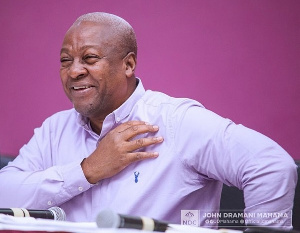Opinions of Monday, 8 August 2022
Columnist: Anthony Obeng Afrane
2022-08-08Mahama's policy thrust at the tertiary education level (2)
 Former president, John Dramani Mahama
Former president, John Dramani Mahama
According to a World Bank document, the economic returns for tertiary education graduates are the highest in the entire educational system -- an estimated 17% increase in earnings as compared with 7% for primary and 10% for secondary education. These high returns are even greater in Sub-Saharan Africa, at an estimated 21% increase in earnings for tertiary education graduates. For this
Read full articlereason, President Mahama saw it necessary to invest heavily in the tertiary level of education in Ghana.
At the University of Energy and Natural Resources (UENR) in the Bono Region, the following were done: a modern library, ICT complex, laboratory complex and new classroom blocks with offices.
A total of 129 major projects were at various stages of completion in other tertiary institutions before he left office on January 7, 2017. These comprise libraries, administration blocks, laboratories, bungalows, hostels, lecture theatres and general landscaping.
President Mahama also started the construction work of the University of Environment and Sustainable Development.
Under a US$24 million project, three African Education Centres of Excellence were established in Ghana. They are the West African Centre for Cell Biology of Infectious Pathogens (WACCBIP) at the University of Ghana, the West African Centre for Crop Improvement (WACCI) an African Centre of Excellence for training plant breeders, seed scientists and seed technologists at the University of Ghana; and the Regional Centres of Excellence for Water and Environmental Sanitation at KNUST.
Reforms aimed at achieving equity and completing the tertiarisation of all 38 public Colleges of Education continued under the watchful eyes of H.E. John Dramani Mahama. The reforms ensured that the Colleges of Education operated at full capacity, thereby guaranteeing an enhanced supply of trained teachers.











